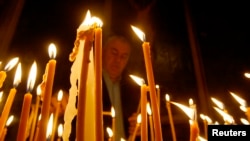ISTANBUL —
Syrian rebels recently overran Kassab, a town near the Turkish border inhabited by ethnic Armenians. That action has drawn attention to Turkey's relationship with radical Islamic factions in the Syrian conflict, and it has resurrected a century-old controversy.
Ankara has faced mounting international criticism since Islamist fighters overran Kassab in late March. Many of the town's ethnic Armenian residents fled, charging that Ankara had supported the jihadists.
Turkey denies the charges, but some observers say whether or not they are true, it is paying a high price. All the more so, given that the attack on Kassab occurred on the eve of key anniversary - every April Armenians commemorate what they say was the killing in 1915 of more than one million of their people by Turkey’s then Ottoman rulers.
Armenians are stepping up their drive for international recognition of those killings as genocide ahead of next year's 100th anniversary.
Members of the Armenian diaspora community are leading the criticism of Turkey over the attack on Kassab, charging that Turkey facilitated it, or at least failed to use its influence to prevent it.
Ankara strongly rejects the charge that what happened in 1915 amounts to genocide, and disputes the number of deaths. But Sinan Ulgen, a visiting scholar at Carnegie Europe in Brussels, said the issue will not go away. He noted that a legislative proposal in France to make it illegal to deny that the 1915 killing of Armenians was genocide, while it was ultimately rejected by France's constitutional court, caused a major diplomatic uproar.
"We see this constantly. The bill, which led to a big crisis between Turkey and France, is just one example," said Ulgen. "And now we are coming to 2015, the centennial of the 1915 events, and obviously Turkey will have to address that."
Armenian President Serzh Sargsyan has already compared the events in Kassab to those of 1915. Ankara is working to contain the damage, with state media broadcasting interviews with Armenians from Kassab who have taken refuge in Turkey.
But Semih Idiz, a diplomatic columnist for the Turkish newspaper Taraf and the Al Monitor website, said Ankara has blundered.
"I think it was a miscalculation, bringing up the whole Armenian issues, and it will also highlight the fact that Turkey is helping these extreme jihadist groups," said Idiz. "So it will really be a question of how the situation is going to be managed and what actually happens in Kassab itself. Now if things get out of hand, it will reflect badly on Turkey."
Ankara denies it is supporting groups like the al-Qaida-affiliated al-Nusra Front, one of the militant Islamist factions in Syria. It also claims -- as do the Syrian rebels in Kassab -- the town's ethnic identity is being respected.
With the Turkish government already facing growing criticism both nationally and internationally over its relations with jihadist groups in Syria, observers say the events in Kassab will add to the pressure on Ankara to review its strategy toward Syria.
Ankara has faced mounting international criticism since Islamist fighters overran Kassab in late March. Many of the town's ethnic Armenian residents fled, charging that Ankara had supported the jihadists.
Turkey denies the charges, but some observers say whether or not they are true, it is paying a high price. All the more so, given that the attack on Kassab occurred on the eve of key anniversary - every April Armenians commemorate what they say was the killing in 1915 of more than one million of their people by Turkey’s then Ottoman rulers.
Armenians are stepping up their drive for international recognition of those killings as genocide ahead of next year's 100th anniversary.
Members of the Armenian diaspora community are leading the criticism of Turkey over the attack on Kassab, charging that Turkey facilitated it, or at least failed to use its influence to prevent it.
Ankara strongly rejects the charge that what happened in 1915 amounts to genocide, and disputes the number of deaths. But Sinan Ulgen, a visiting scholar at Carnegie Europe in Brussels, said the issue will not go away. He noted that a legislative proposal in France to make it illegal to deny that the 1915 killing of Armenians was genocide, while it was ultimately rejected by France's constitutional court, caused a major diplomatic uproar.
"We see this constantly. The bill, which led to a big crisis between Turkey and France, is just one example," said Ulgen. "And now we are coming to 2015, the centennial of the 1915 events, and obviously Turkey will have to address that."
Armenian President Serzh Sargsyan has already compared the events in Kassab to those of 1915. Ankara is working to contain the damage, with state media broadcasting interviews with Armenians from Kassab who have taken refuge in Turkey.
But Semih Idiz, a diplomatic columnist for the Turkish newspaper Taraf and the Al Monitor website, said Ankara has blundered.
"I think it was a miscalculation, bringing up the whole Armenian issues, and it will also highlight the fact that Turkey is helping these extreme jihadist groups," said Idiz. "So it will really be a question of how the situation is going to be managed and what actually happens in Kassab itself. Now if things get out of hand, it will reflect badly on Turkey."
Ankara denies it is supporting groups like the al-Qaida-affiliated al-Nusra Front, one of the militant Islamist factions in Syria. It also claims -- as do the Syrian rebels in Kassab -- the town's ethnic identity is being respected.
With the Turkish government already facing growing criticism both nationally and internationally over its relations with jihadist groups in Syria, observers say the events in Kassab will add to the pressure on Ankara to review its strategy toward Syria.




